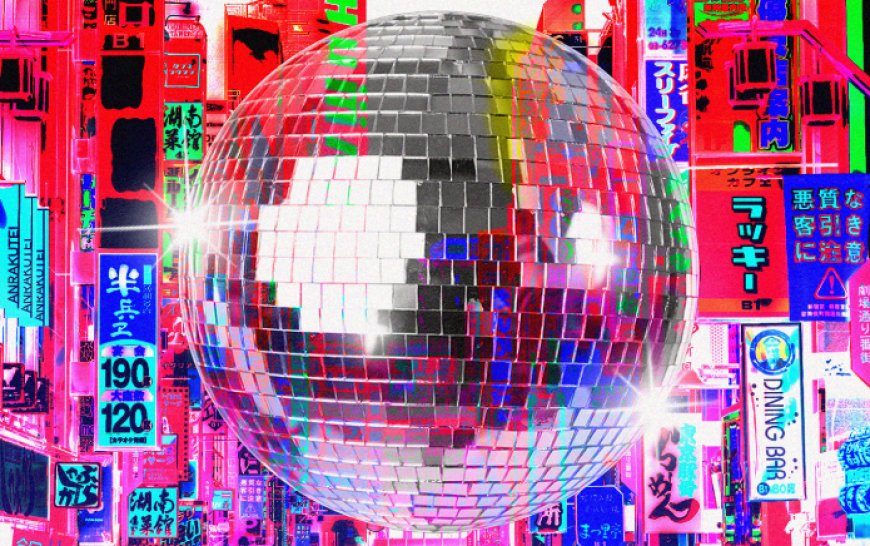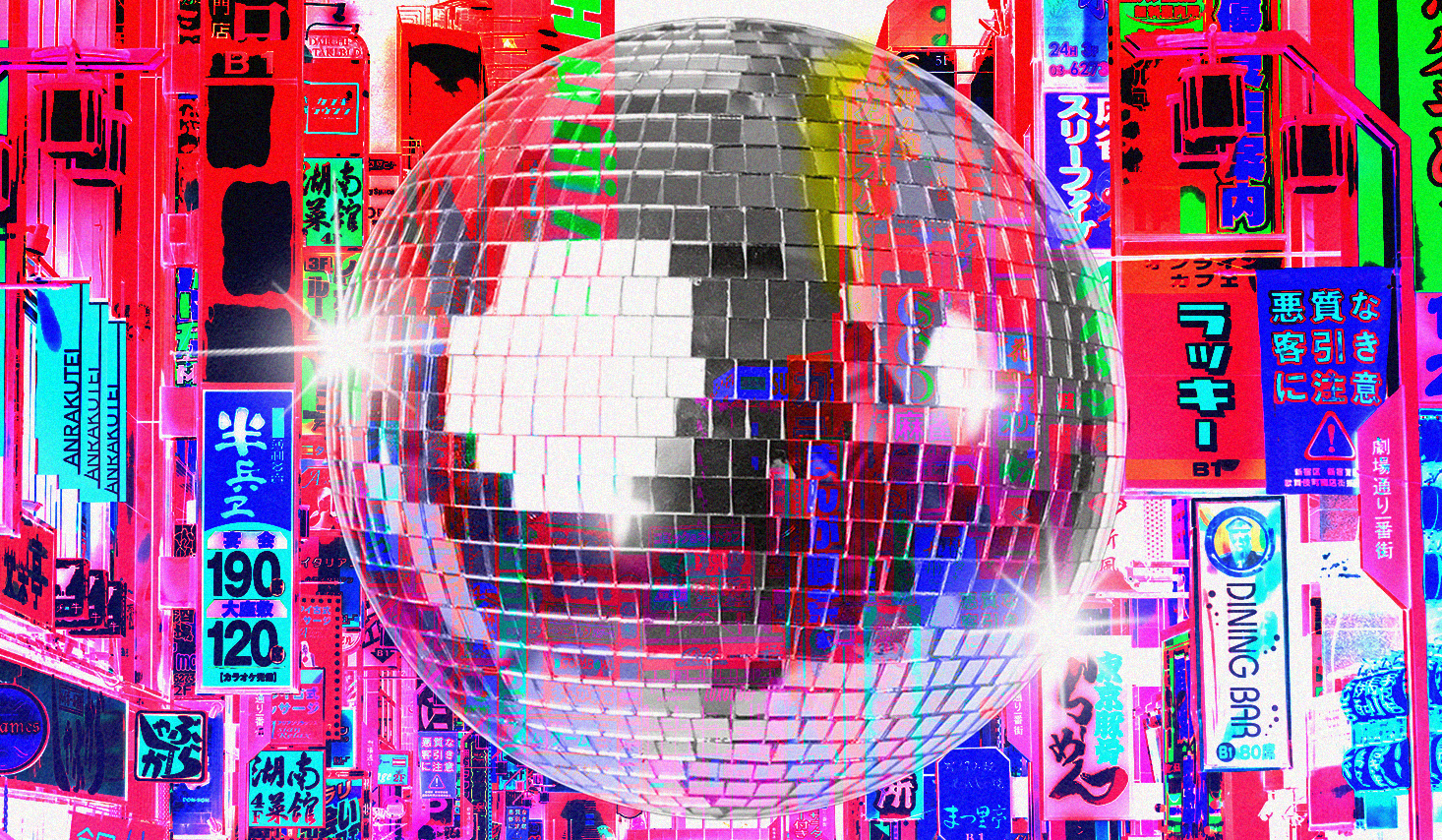Tokyo’s queer club scene is sweaty, messy and surrounding you at all sides
From sweaty techno parties to late-night drag showcases, Kat Joplin explores how the city’s growing LGBTQIA+ district is creating space for trans and non-binary communities. WORDS BY KAT JOPLIN HEADER… The post Tokyo’s queer club scene is sweaty, messy and surrounding you at all sides appeared first on GAY TIMES.


From sweaty techno parties to late-night drag showcases, Kat Joplin explores how the city’s growing LGBTQIA+ district is creating space for trans and non-binary communities.
WORDS BY KAT JOPLIN
HEADER DESIGN BY ANISA CLEAVER

The Shibuya club is small but packed with life. Rotating beams of coloured lights overhead, shivering curtains of blue and green hair on the dance floor. Stick-and-poke and abstract tattoos, heavy eyeliner, lipstick in shades of pink and turquoise. Loud conversations shouted over the techno: Japanese, Portuguese, English, and more. Barely visible in the flashing lights, the walls are hung with pride flags and hard leftist political posters reading: “Trans Rights Are Human Rights” and “There is no LGB without the T”. A red flag with the words “cisnormativity”, ”heterosexism”, and “colonialism” slashed out.
In Tokyo, Japan, the seemingly quiet years of COVID-19 lockdown were more like a pressure cooker for the city’s bursting scene of LGBTQIA-focused and friendly club events. These days, queer folks looking to experience Tokyo nightlife can choose from a list ranging from alternative hotspots like Department H, femme-centred and artistic parties like Waifu, to packed, noisy, and sweaty techno raves like Slick and Switch. These events are political, queerness is always political. They are spaces that shout and scream messages of sex positivity, queer liberation, and women’s empowerment. In a city like Japan’s capital, with its long history of diverse subcultures, everyone can find their community.
A History of Nonconformity – Department H
An old three-tier theatre, faded floral carpets, a crowd full of scantily-clad weirdos watching as a man rolls in a pile of flowers across the stage to music: welcome to Department H. Tokyo’s largest and longest-running kink and fetish club, the KitKatClub-esque Department H is the best example of Tokyo’s long-standing track record of queer-inclusive subculture. Organised by cartoon illustrator and professional party host Gogh Imaizumi and head drag queen Maruyacco, Department H is an eclectic mob of the city’s strangest: latex fans, drag queens, and monster cosplayers. On stage, the event showcases a lineup of drag pageants, contortionists, and choreographed wrestling matches. Occasionally, one entertainer holds ‘fisting 101 workshops’.
Department H began during Japan’s recession period, in 1993, following the collapse of the country’s economic bubble. As the prosperous decades of Japan leading the tech and business world ended, a generation of white-collar company employees were trapped in unsatisfying jobs without the promised security and promotions waiting for them. Department H was one party which succeeded as a secret escape for the people of this decade, a place to flee the drab normalcy of the office for the low-lit splendour of the fetish and queer circles.
“Department H is a meeting place, a safe space for people to express fetishes and dress up,” says French-born Maxim Lebosse, who occasionally works as a drag queen and DJ at H. “It’s a little like a freak show, with drag queens and an emcee, serving as security throughout the night. We protect people and preserve the harmony.”
Rather than being an exclusively LGBTQIA+ party, Department H is an event that has always organically brought Tokyo’s queer and alternative crowds together. In particular, Department H was one of the first major events where trans women, non-binary people, and others who defy categories could gather to freely explore their gender identities and expressions. Seemingly, the only rules for attending Department H are to buck social conformity and to respect one another.
While it might look strange or off-putting from the outside, Department H parties are among the friendliest and most truly inclusive spaces I have ever known and are an important staple in the story of Tokyo’s queer-friendly nightlife. “Department H is important because it is a community whose foundations and welcomeness are unique,” says Lebosse. “It offered the concept of ‘safe spaces’ before those were even discussed as such.”
How Tokyo’s contemporary queer is growing
Launched in 2019, Waifu was the first of Tokyo’s new wave of politically queer club events: a self-proclaimed femme-led safe space for people of all genders and sexualities. It is currently operated by a team of five: Elin McCready, Midori Morita, Maiko Asami, Lauren Rose Kocher, and DJ Chloe Danslaville. Their goal was to carve a queer party scene beyond the Gay Town of Shinjuku Ni-chōme, where clubs and bars generally cater to gay men and exclusive body types within that community (such as bears). Many members of the genderqueer and trans community falling between specific genders, sexes, and types at times felt unwelcome in these old haunts.
Following a traumatic incident where founder McCready was denied entry to a lesbian bar for being trans, the team decided to begin their own event. “We needed our own space for us because Ni-chōme as it stands is not that space,” McCready says. “Like a lot of areas around the world, it’s classically a lot of cisgender gay men. If you don’t fit in these categories – if you’re trans – you’re an outlier and there isn’t a space where you feel comfortable.”
From the start, Waifu aimed to welcome sapphics and lesbians of all backgrounds, particularly trans women and non-binary identities. From being among the most invisible in Japan’s queer community, these groups now had a party founded to meet their needs. Waifu events are filled with colourful crowds: drag queens, college students, DJs, leftist agitators and artists of all backgrounds. A place where the odds and ends of society collect and network within the massive cityscape of Tokyo.
Recently, team members Maiko Asami and Midori Morita have spearheaded events such as a collaborative vigil and pro-Palestine fundraiser with Iwakan Magazine for the Trans Day of Remembrance. In conceptualising Waifu as a safer space, the team realised it was essential to lay down and enforce rules but to also share know-how with the attendees.
With that goal in mind, Waifu has held workshops on consent and respectful flirting, hosted speeches on trans rights, and even sold zines and books that promote queer and feminist topics. Far from being merely a party, Waifu feels like a micro-city of radical activism. Asami explains, “We aim to maintain Waifu’s queer femme-centricity by booking many female or queer femme DJs and performers. We want to reclaim the club scene as a minority space since discrimination and harassment have become so rampant in commercialised clubs today.”
We want to reclaim the club scene as a minority space since discrimination and harassment have become so rampant in commercialised clubs today
Waifu has formed something of a blueprint and inspiration for the LGBTQIA+ club events that have launched since, with Waifu team members going on to co-found other parties and raves and working closely with many other overlapping events. This has been instrumental in building the diverse range of LGBTQIA+ club events in Tokyo, notably welcoming the femme and trans community. Morita relates, “Our message is, ‘there is a place for you here even if you are outside of the social norm,’ and such actions have been contagious among other event organisers.”
Slick, Switch, and Radical Queer Raves
Messy, sweaty, dark, and dynamic, Slick’s raves offer something different, they’re freer and more. While the Waifu party had accomplished many of the team’s goals for politicising clubs and giving queer femmes a safer playground, its founders felt it lacked the edginess and vibrant sexuality that they had enjoyed in their own clubbing lives – those aspects which had made the counterculture of the clubs feel liberatory to begin with.
“The ‘party’ aspect for Waifu started to fade a bit as time went on,” Morita says. “I’m a clubber, so I wanted to create a new event that was still for queers, but even more so ‘a place for clubbers.’ A place for outsiders who can only find their place in clubs.”
With that in mind, in 2020 Waifu founders McCready and Morita joined with Mari Sakurai and Nanae Shimazu (known professionally as 7e) to form Slick, a liberating outdoor rave for the queer community. “Waifu is a space that’s about being safe from something – ‘safe from homophobia, transphobia, harassment,’” McCready explains. “Slick is more of a ‘safe to do’ space. Safe to do what you want: have sex, be messy, whatever you need, as long as it doesn’t hurt anyone else.”
With its dark rooms and loud music, Slick brings partygoers, DJs flown in from Berlin, eccentric fashion, and a more sexual atmosphere. Later in 2021, DJs Matrix3k and Kali Masha founded the queer techno collective Switch with similar goals in mind. A “sweatbox with hard music” Switch is a party held both in Tokyo and in Matrix3k’s native Warsaw, Poland, and often brings a more old-school vibe through its music.
“During the COVID pandemic, the scene in Tokyo was pretty dead. We felt like there was something missing in the scene,” Matrix3k says. “We wanted to create a ‘space’ that was based on radical self-expression, where everyone could just be as they are. That’s also why we don’t allow photos during our parties.”
A place to be young, wild, and queer
Visiting a queer-inclusive club event in Tokyo is like stepping into an imagined future utopia: dismantled social conventions, reinvented gender, queer joy. Looking across the board at events like Department H, Waifu, Slick, and Switch, as well as smaller and artsier gatherings such as Sarau, Rio51, and QLove, one of the most exciting elements of Tokyo’s clubbing scene is its growing diversity: there is something for everyone, and everyone can play and discover themselves at their own speed.
Nadina Osmani, a representative of the Tokyo Queer Collective (TQC), reflected on how the queer club scene has become more inclusive in recent years. “Previously we felt the Tokyo scene in general lacked a sense of queerness. As much as we love getting to enjoy Asia’s largest gay quarter, to us Shinjuku Ni-chōme often feels catered to the cis-male gay experience specifically,” says Osmani. “There are a lot of gay venues and some lesbian venues, but not many queer venues. I think it’s as simple as queer people exist, and always have, there are plenty of us, and we deserve to be the primary audience somewhere.”
She and her fellow TQC members are fans, friends and regular attendees of Waifu and Slick, and have worked together with Asami and McCready at several pro-trans events – an important element at these parties and art collectives, where activists critique Western pinkwashing campaigns and draw parallels between the shared oppressed experiences of LGBTQIA+ people.
Henry Tse, a trans activist based in Hong Kong, was moved by the strong focus on social justice and community in these queer parties, especially Waifu specifically. TQC co-founder Janay Baade, originally from Canada, spoke similarly of their experience at Slick, describing it as the first rave and queer event in Tokyo they’d ever attended.
I felt welcomed by the organisers, made lifelong friends, and genuinely felt safe.
“It was the first time I saw so many different kinds of bodies and people,” they say. “I felt welcomed by the organisers, made lifelong friends, and genuinely felt safe.” UK-born Maggie Duguid, who is deeply involved in Tokyo’s lesbian circles, similarly applauded the Waifu events she had attended in the past, describing the party as “very meaningful” as a “sapphic-led and focused space that is accessible to anyone” in a city where ‘queer’ is often limited to ‘gay male.’
She continues: “I think it’s especially important, with a large number of lesbian trans women, that they are vocally welcoming to the trans community, where we can celebrate our lesbian identities alongside allies.” Future attendees like Duguid hope for one where the separate factions of the LGBTQIA community can come together in more progressive and informed ways, where trans and cisgender lesbian women are embraced and celebrated on an equal level with their gay kin.
In the present day, when queer identity can so often be wrapped up with sadness, pain, and struggles for visibility, these spaces where LGBTQIA+ people can revel in nonconformity are incredibly precious. While the outside world can feel like a neverending reel of shocking headlines and sober reminders of how behind the world can be, these are the places where we can see a glimpse of the world we are working towards; a liberated, messy, and creative environment. These are the places where your queer community is close and tangible, surrounding you on all sides.
The post Tokyo’s queer club scene is sweaty, messy and surrounding you at all sides appeared first on GAY TIMES.

 Mark
Mark 





